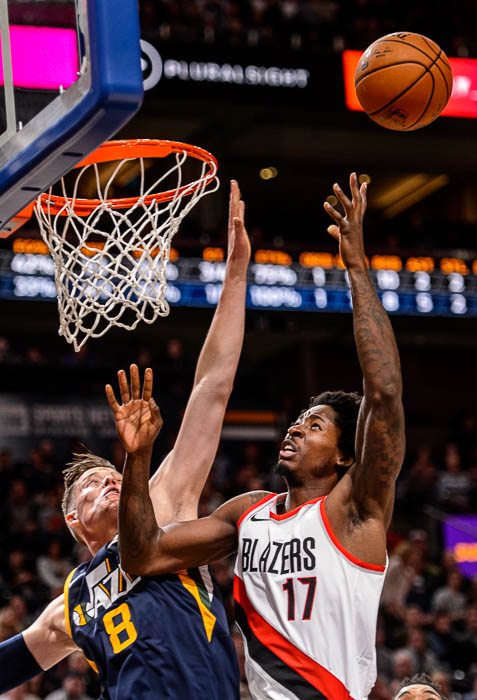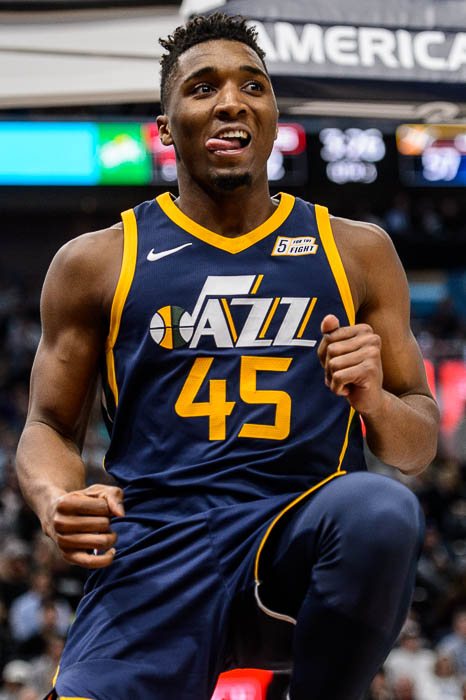





































Barely a minute into Wednesday’s fourth quarter, Jazz rookie Donovan Mitchell checked back into the game for Rodney Hood, who pointed to his jersey as if to ask, “Me?”
Yeah, you. This was not Hood’s night, considering he missed all 11 of his shots from the field. Not much all suggested this exercise would turn out favorably for the Jazz, as they struggled like crazy to score and defend former Weber State star Damian Lillard of Portland.
Apparently, all they needed to do was make a long night last even longer. A team that scored only 64 points through three quarters somehow produced 18 points in the five-minute overtime of a 112-103 victory at Vivint Smart Home Arena.
And a game that seemingly belonged to Lillard in the fourth quarter became a showcase for Jazz newcomers Ricky Rubio and Mitchell, who combined for 58 points to overcome Lillard’s 33. The Jazz (5-3) never should have won this thing – except the home team showed some toughness that was missing at times in this building last season, even as the Jazz compiled a 51-31 record.
They’re 5-0 at Vivint, thanks to another determined effort, amid some lousy offensive basketball. “We hung in there,” said Jazz coach Quin Snyder, “and didn’t get discouraged.”
That easily could have happened, when the Jazz simply couldn’t score for so long. Wow, how agonizing was it to live through the Jazz’s second quarter, when they made 2 of 18 shots?
In July, I warned you there would be nights like this after the team lost Gordon Hayward and George Hill, saying the arena renovation was “designed to enhance the experience of watching a team that will score 85 points some nights.”
That number seemed optimistic at some checkpoints Wednesday. Yet the Jazz delivered 30 points in the fourth quarter and somehow made it into overtime at 94 apiece after Rudy Gobert’s block of Lillard. Rubio’s offense with 11 points in OT and Thabo Sefolosha’s defense on Lillard took care of the rest.
The Jazz were averaging 95.9 points through seven games, nearly five points fewer than their production last season. The consolation? They were third to last in the NBA then, when they featured Hayward and Hill, and they’re third to last now without those guys.
“We know we don’t have the same team,” Snyder said before facing Portland. “We lost our two leading scorers. … So, all right. Let’s look at it and see what we’ve got, and how we want to approach [it] and then evaluate what’s happening.”
The trend is clear: The Jazz will have a tough time merely outscoring opponents. “Adaptations and adjustments, that’s my job,” Snyder said. “Regardless of sample size, you try to address things and work on them. We have to create shots collectively. We don’t have a lot of people on the floor that can get their own shots, and that’s OK.”
And one of those players, veteran forward Joe Johnson, will be sidelined for two weeks or longer with a wrist injury. The Jazz found ways to compensate for his absence Wednesday, even while making only about one-third of their 2-point shots. Hood was 0 for 10 from that range, after scoring 25 points Monday vs. Dallas.
The Jazz subdued Lillard in the end, though. “Damian Lillard is one of the premier players in our league, and he’s shown that year after year,” Snyder said. “He’s just a very difficult player to guard. He’s able to really extend you, because of his range. If you back up at all, he’s shooting as soon as he comes across half-court.”
After the Blazers’ morning shootaround, Lillard said, “Just because I miss some shots, I’m not going to stop.”
Lillard kept firing against the Jazz, finally missing often enough in overtime for the home team’s sake. He made the Jazz earn this victory, and that’s exactly what they did.